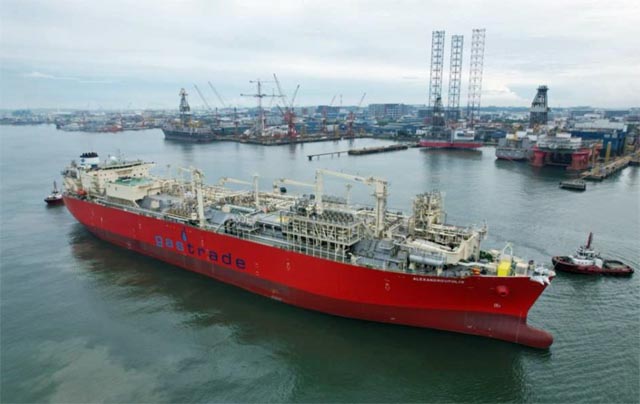Seatrium of Singapore has delivered the Floating Storage and Regasification Unit (FSRU) ‘Alexandroupolis’, which has completed its near shore testing works and has set sail to Greece for final gas commissioning of the regasification system.
The project was successfully delivered to GAS-fifteen, a wholly-owned subsidiary of GasLog LNG Services.
Chris Ong, CEO Seatrium said: “We are pleased to support Gaslog and contribute towards Greece’s energy future with the delivery of the first FSRU for the country through the Alexandroupolis Independent Natural Gas System (INGS) project. This project marks a significant
milestone for Seatrium, affirming our position as a global player with industry-leading engineering expertise in the gas value chain. We look forward to delivering more of such innovative solutions to meet our clients’ evolving needs.”
As the first FSRU for Greece, the INGS project will become a critical energy gateway, supporting its energy security while advancing the energy transition trajectory of Southeastern Europe.
Seatrium’s scope of work for this project includes refurbishment and life extension works, engineering and procurement, fabrication, and installation of a new regasification skid, as well as supporting systems such as boilers, offloading, electrical and automation systems. When completed, FSRU Alexandroupolis will be deployed in waters some 17km southwest of the Port of Alexandroupolis, Northern Greece, and will have an overall delivery capacity of approximately 5.5bn m3 per year, with a peak send out of 22m m3 per day. The 155,000m3 LNG carrier, recently reflagged to the Hellenic Register, is the first FSRU conversion under the Greek Flag for operation in the Thracian Sea.
The FSRU will eventually be owned and managed by Gastrade, a consortium of key players in the wider region’s energy market, and will supply the markets of Southeastern Europe with natural gas.
Seatrium says it is committed to driving cleaner and more sustainable solutions for the offshore, marine and energy industries. The Group supports the decarbonisation efforts of its customers through the construction, conversion and retrofit of energy-efficient vessels. Compared to a newbuild FSRU, a converted FSRU is believed to have a smaller carbon footprint, to be more cost-effective, and faster-to-market. Seatrium claims an extensive track record in the conversion of vessels. In addition to converting the world’s first FSRU in 2008, Seatrium converted the world’s First Floating Production Storage and Offloading vessel (FPSO) in 1981, and the world’s first floating liquefaction vessel (FLNG) in 2017.



